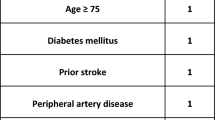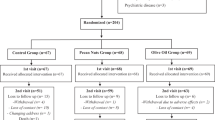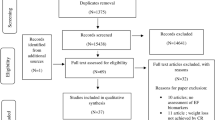Abstract
Background/objective
Available data indicate a possible beneficial effect of flaxseed on cardiovascular disease, but limited studies have evaluated the effects of flaxseed on endothelial dysfunction and biomarkers of inflammation in patients with coronary artery disease (CAD). The purpose of the present study was to examine the effect of flaxseed consumption on flow-mediated dilation (FMD) and inflammatory markers in CAD patients.
Subjects/method
In this randomized controlled parallel trial, 50 patients with CAD of both genders were randomly allocated to 12 weeks consumption of flaxseed (30 g/day) or usual care control. Before and after the intervention, changes in brachial FMD and plasma high-sensitivity C-reactive protein (hs-CRP), interleukine-6 (IL-6), and tumor necrosis factor-α (TNF-α) were measured.
Results
Forty-four participants (aged 56.43 ± 8.21 years; BMI 26.65 ± 2.44 kg/m2) completed the study. No significant weight change was observed in either group. Compared to control (n = 23), flaxseed consumption (n = 21) was associated with improved FMD (mean of change from baseline was 5.1 vs −0.55%; p = 0.001 for the flaxseed and control, respectively). When compared to control, flaxseed consumption was associated with reduced inflammatory markers (mean of change from baseline for hs-CRP was −1.18 and −0.3 mg/L, p = 0.003; for IL-6 was −7.65 and −0.77 pg/mL, p = 0.017; for TNF-α was −34.73 and −2.18 pg/mL p = 0.001 in flaxseed and control, respectively).
Conclusions
The results of this study indicate that by adding flaxseed to diet of CAD patients, it is possible to improve FMD and plasma levels of inflammatory markers.
This is a preview of subscription content, access via your institution
Access options
Subscribe to this journal
Receive 12 print issues and online access
$259.00 per year
only $21.58 per issue
Buy this article
- Purchase on Springer Link
- Instant access to full article PDF
Prices may be subject to local taxes which are calculated during checkout

Similar content being viewed by others
References
Laslett LJ, Alagona Jr P, Clark Iii BA, Drozda Jr JP, Saldivar F, Wilson SR, et al. The worldwide environment of cardiovascular disease: prevalence, diagnosis, therapy, and policy issues: a report from the American college of cardiology. J Am Coll Cardiol. 2012;60(25 SUPPL.):S1–S49.
Versari D, Daghini E, Virdis A, Ghiadoni L, Taddei S. Endothelial dysfunction as a target for prevention of cardiovascular disease. Diabetes Care. 2009;32(Suppl 2):S314–21.
Koyoshi R, Miura S, Kumagai N, Shiga Y, Mitsutake R, Saku K. Clinical significance of flow-mediated dilation, brachial intima-media thickness and pulse wave velocity in patients with and without coronary artery disease. Circ J. 2012;76:1469–75.
Sugamata W, Nakamura T, Uematsu M, Kitta Y, Fujioka D, Saito Y, et al. Combined assessment of flow-mediated dilation of the brachial artery and brachial-ankle pulse wave velocity improves the prediction of future coronary events in patients with chronic coronary artery disease. J Cardiol. 2014;64:179–84.
Zhang C. The role of inflammatory cytokines in endothelial dysfunction. Basic Res Cardiol. 2008;103:398–406.
Ong P, Sivanathan R, Borgulya G, Bizrah M, Iqbal Y, Andoh J, et al. Obesity, inflammation and brachial artery flow-mediated dilatation: therapeutic targets in patients with microvascular angina (cardiac syndrome X). Cardiovasc Drugs Ther. 2012;26:239–44.
Yousuf O, Mohanty BD, Martin SS, Joshi PH, Blaha MJ, Nasir K, et al. High-sensitivity C-reactive protein and cardiovascular disease: a resolute belief or an elusive link? J Am Coll Cardiol. 2013;62:397–408.
Buckley DI, Fu R, Freeman M, Rogers K, Helfand M. C-reactive protein as a risk factor for coronary heart disease: a systematic review and meta-analyses for the U.S. Preventive Services Task Force. Ann Intern Med. 2009;151:483–95.
Libby P, Okamoto Y, Rocha VZ, Folco E. Inflammation in atherosclerosis: transition from theory to practice. Circ J. 2010;74:213–20.
Kaptoge S, Seshasai SR, Gao P, Freitag DF, Butterworth AS, Borglykke A, et al. Inflammatory cytokines and risk of coronary heart disease: new prospective study and updated meta-analysis. Eur Heart J. 2014;35:578–89.
Hu FB. Do functional foods have a role in the prevention of cardiovascular disease? Circulation. 2011;124:538–40.
Kajla P, Sharma A, Sood DR. Flaxseed-a potential functional food source. J Food Sci Technol. 2015;52:1857–71.
Ren GY, Chen CY, Chen GC, Chen WG, Pan A, Pan CW, et al. Effect of flaxseed intervention on inflammatory marker C-reactive protein: a systematic review and meta-analysis of randomized controlled trials. Nutrients. 2016;8:136.
Dupasquier CM, Weber AM, Ander BP, Rampersad PP, Steigerwald S, Wigle JT, et al. Effects of dietary flaxseed on vascular contractile function and atherosclerosis during prolonged hypercholesterolemia in rabbits. Am J Physiol Heart Circ Physiol. 2006;291:H2987–96.
Nunes DO, Almenara CC, Broseghini-Filho GB, Silva MA, Stefanon I, Vassallo DV, et al. Flaxseed oil increases aortic reactivity to phenylephrine through reactive oxygen species and the cyclooxygenase-2 pathway in rats. Lipids Health Dis. 2014;13:107.
Shivappa N, Steck SE, Hurley TG, Hussey JR, Hebert JR. Designing and developing a literature-derived, population-based dietary inflammatory index. Public Health Nutr. 2014;17:1689–96.
Moncada S, Higgs A. The L-arginine-nitric oxide pathway. N Engl J Med. 1993;329:2002–12.
Giacomino S, Penas E, Ferreyra V, Pellegrino N, Fournier M, Apro N, et al. Extruded flaxseed meal enhances the nutritional quality of cereal-based products. Plant Foods Hum Nutr. 2013;68:131–6.
Brown AA, Hu FB. Dietary modulation of endothelial function: implications for cardiovascular disease. Am J Clin Nutr. 2001;73:673–86.
West SG, Krick AL, Klein LC, Zhao G, Wojtowicz TF, McGuiness M, et al. Effects of diets high in walnuts and flax oil on hemodynamic responses to stress and vascular endothelial function. J Am Coll Nutr. 2010;29:595–603.
West SG, Hecker KD, Mustad VA, Nicholson S, Schoemer SL, Wagner P, et al. Acute effects of monounsaturated fatty acids with and without omega-3 fatty acids on vascular reactivity in individuals with type 2 diabetes. Diabetologia. 2005;48:113–22.
van der Schouw YT, Pijpe A, Lebrun CE, Bots ML, Peeters PH, van Staveren WA, et al. Higher usual dietary intake of phytoestrogens is associated with lower aortic stiffness in postmenopausal women. Arterioscler Thromb Vasc Biol. 2002;22:1316–22.
Hallund J, Tetens I, Bugel S, Tholstrup T, Ferrari M, Teerlink T, et al. Daily consumption for six weeks of a lignan complex isolated from flaxseed does not affect endothelial function in healthy postmenopausal women. J Nutr. 2006;136:2314–8.
Weiner SD, Ahmed HN, Jin Z, Cushman M, Herrington DM, Nelson JC, et al. Systemic inflammation and brachial artery endothelial function in the Multi-Ethnic Study of Atherosclerosis (MESA). Heart. 2014;100:862–6.
Hallund J, Tetens I, Bugel S, Tholstrup T, Bruun JM. The effect of a lignan complex isolated from flaxseed on inflammation markers in healthy postmenopausal women. Nutr Metab Cardiovasc Dis. 2008;18:497–502.
Zhao G, Etherton TD, Martin KR, West SG, Gillies PJ, Kris-Etherton PM. Dietary alpha-linolenic acid reduces inflammatory and lipid cardiovascular risk factors in hypercholesterolemic men and women. J Nutr. 2004;134:2991–7.
Khalatbari Soltani S, Jamaluddin R, Tabibi H, Mohd Yusof BN, Atabak S, Loh SP, et al. Effects of flaxseed consumption on systemic inflammation and serum lipid profile in hemodialysis patients with lipid abnormalities. Hemodial Int. 2013;17:275–81.
Zong G, Demark-Wahnefried W, Wu H, Lin X. Effects of flaxseed supplementation on erythrocyte fatty acids and multiple cardiometabolic biomarkers among Chinese with risk factors of metabolic syndrome. Eur J Nutr. 2013;52:1547–51.
Machado AM, de Paula H, Cardoso LD, Costa NM. Effects of brown and golden flaxseed on the lipid profile, glycemia, inflammatory biomarkers, blood pressure and body composition in overweight adolescents. Nutrition. 2015;31:90–6.
Bloedon LT, Balikai S, Chittams J, Cunnane SC, Berlin JA, Rader DJ, et al. Flaxseed and cardiovascular risk factors: results from a double blind, randomized, controlled clinical trial. J Am Coll Nutr. 2008;27:65–74.
Dodin S, Cunnane SC, Mâsse B, Lemay A, Jacques H, Asselin G, et al. Flaxseed on cardiovascular disease markers in healthy menopausal women: a randomized, double-blind, placebo-controlled trial. Nutrition. 2008;24:23–30.
Lu LJ, Anderson KE. Sex and long-term soy diets affect the metabolism and excretion of soy isoflavones in humans. Am J Clin Nutr. 1998;68(6 Suppl):1500s–4s.
Pan A, Demark-Wahnefried W, Ye X, Yu Z, Li H, Qi Q, et al. Effects of a flaxseed-derived lignan supplement on C-reactive protein, IL-6 and retinol-binding protein 4 in type 2 diabetic patients. Br J Nutr. 2009;101:1145–9.
Taylor CG, Noto AD, Stringer DM, Froese S, Malcolmson L. Dietary milled flaxseed and flaxseed oil improve N-3 fatty acid status and do not affect glycemic control in individuals with well-controlled type 2 diabetes. J Am Coll Nutr. 2010;29:72–80.
Edel AL, Patenaude AF, Richard MN, Dibrov E, Austria JA, Aukema HM, et al. The effect of flaxseed dose on circulating concentrations of alpha-linolenic acid and secoisolariciresinol diglucoside derived enterolignans in young, healthy adults. Eur J Nutr. 2016;55:651–63.
Nakamura T, Kitta Y, Uematsu M, Sugamata W, Hirano M, Fujioka D, et al. Ultrasound assessment of brachial endothelial vasomotor function in addition to carotid plaque echolucency for predicting cardiovascular events in patients with coronary artery disease. Int J Cardiol. 2013;167:555–60.
Acknowledgements
The study was supported by National Nutrition and Food Technology Research Institute, Shahid Beheshti University of Medical Sciences, Tehran, Iran. We thank the radiology ward personnel of Shahid Rajaei Hospital, especially Dr Sanaz Asadian. We are also grateful to the volunteers who participated in the study.
Funding
This study was supported by National Nutrition and Food Technology Research Institute, Shahid Beheshti University of Medical Sciences, grant number No. 652.
Author information
Authors and Affiliations
Corresponding author
Ethics declarations
Conflict of interest
The authors declare that they have no conflict of interest.
Rights and permissions
About this article
Cite this article
Khandouzi, N., Zahedmehr, A., Mohammadzadeh, A. et al. Effect of flaxseed consumption on flow-mediated dilation and inflammatory biomarkers in patients with coronary artery disease: a randomized controlled trial. Eur J Clin Nutr 73, 258–265 (2019). https://doi.org/10.1038/s41430-018-0268-x
Received:
Revised:
Accepted:
Published:
Issue Date:
DOI: https://doi.org/10.1038/s41430-018-0268-x



